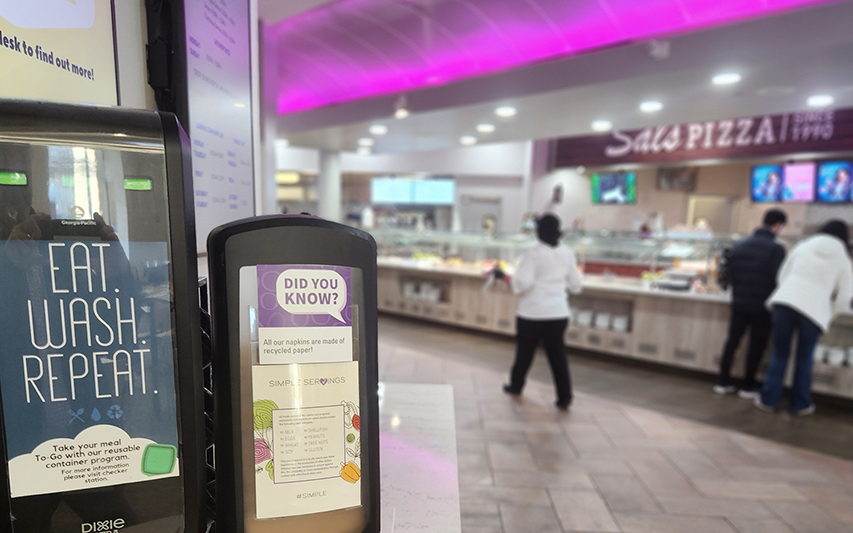
TOPICS:
By Jana F. Brown
The variety of waste reduction options on the Curry campus reads like a menu of sustainable practices. From decreasing food loss to composting to recycling to local sourcing, and more, the leadership of the food services team is resulting in big savings.
In a graphic shared for one day in October alone, efforts to reduce waste resulted in savings of $3,020 and half a ton of squandered food avoided; more than 378 gallons of gas conserved; and 3.36 metric tons of CO2 averted. The decline in unused resources is part of a larger educational effort by Sodexo, the company that administers dining services at Curry, and on-site employees to raise community consciousness of how much can be conserved when individuals are aware of their impact.
One of the most visible efforts to diminish waste has been the implementation of trayless dining. By removing trays, students are encouraged to make more mindful choices and decrease the amount of food they throw away, explains Director of Dining Services Chris Alger. So far, the absence of trays has been successful in reducing post-consumer food excess by 50%. Additionally, students are engaged in educational initiatives that promote sustainability. These include “Weigh the Waste” events that promote understanding of discarding unwanted food.
“The focus behind these events is to share information with the community and bring awareness of what our efforts are and what the results are when we make those efforts,” Alger says. “We were wasting over 500 pounds of food [a day] and we reduced that by at least half. That’s 250 pounds that could have been consumed by someone else.”
Sodexo is able to tag cast-off consumables through its use of Leanpath, an automated food waste tracking system that helps Dining Services collect and analyze data and implement best practices. The program helps set reduction goals and sends alerts to Curry staff when they are approaching those targets. According to Rose Forrest, sustainability coordinator for Sodexo in Massachusetts, Connecticut, and Rhode Island, data gleaned from Leanpath has identified vegetables and eggs as the top discarded foods at Curry, and expired goods as the top reason for overall loss.
“We have a state program called Mass Impact, which is our commitment to local purchasing and supporting the regional food systems in New England,” Forrest says. “We calculate measurements for both in-state purchases and within the region so we can see how we’re measuring up. We also have an external advisory board, so we have members outside of Sodexo to review this information and talk about ways we can align better with state goals.”
Curry is doing its part by forming partnerships with dozens of local vendors for product sourcing, and by supporting organic dairy in New England through the Northeast Organic Family Farm Partnership. To further demonstrate that commitment, the College participates in the Harvest of the Month program (through Mass Impact) to highlight products from more than 30 local farms and promote sustainable sourcing. In addition, all food waste on campus is sent to Hidden Acres Farm, a composting facility based in Medway, Massachusetts. Curry also works with the Red’s Best program, which sources seafood locally and uses the entire catch, including its byproducts, to limit leftover resources. Alger also has enlisted FiltaFry to strain Curry’s fryolator oil twice a week, extending its life. When the oil has reached the end of its usefulness in food preparation, a company called Baker Commodities hauls it away and turns it into biodiesel.
Another way Curry promotes eco-friendly practices is through the purchase of single-stream recycling and sustainable paper products, including compostable Starbucks cups and biodegradable napkins. Students contribute to sustainability efforts by participating in the Green Container program, a reusable to-go box option that minimizes disposable excess. Through Sodexo, the College is also in the process of partnering with food rescue organizations, such as Rescuing Leftover Cuisine and Food Rescue US, to redistribute surplus food to those in need.
For the educational component, Forrest will continue to create opportunities for the Curry community to understand and take action on issues of sustainability. She’s working on an infographic to hang near the dish drop-off station in the main dining hall, which highlights recycling, food waste recovery, and composting, among other areas of interest. While there is much work to be done, Forrest and Alger see positive signs of improvement.
“We know it’s working because I can track local sourcing back to 2021, and I can see the impact,” Forrest says. “I can actually see the percentage, and it might look very small, but 1% savings can equate to thousands of dollars of product. Students are also engaged in that process and I think that positive impact, coupled with the data we see, show we’re headed in the right direction.”